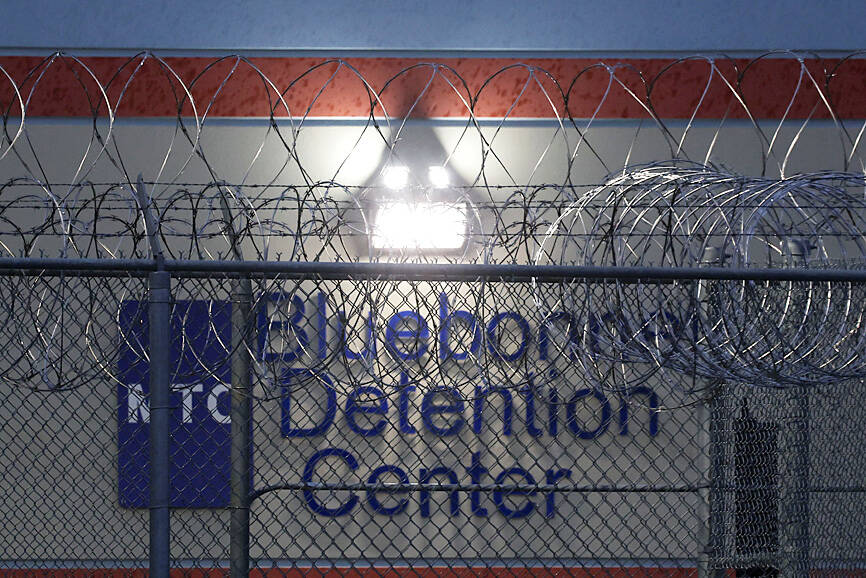The US Supreme Court, in a dramatic nighttime intervention on Saturday, blocked US President Donald Trump’s unprecedented use of an obscure law to deport Venezuelan migrants without due process.
The emergency ruling said that two of the most conservative justices on the nine-member panel had dissented.
The order temporarily prevents the government from continuing to expel migrants under the 1798 Alien Enemies Act — last used to round up Japanese American citizens during World War II.

Photo: Reuters
Trump invoked the law last month to deport Venezuelans to a notorious prison in El Salvador that holds thousands of that country’s gangsters.
The court decision was triggered by imminent plans late on Friday to expel dozens more Venezuelans under the act, meaning they would have been deported with next to no ability to hear evidence or challenge their cases.
The court said that “the government is directed not to remove any member of the putative class of detainees from the United States until further order.”
Trump justifies summary expulsions — and the detention of people in El Salvador — by insisting that he is cracking down on violent Venezuelan criminal gangs now classified by the US government as terrorists.
However, the policy is fueling opposition concerns that the Republican is ignoring the US Constitution in a broader bid to amass power. The row over the Alien Enemies Act comes amid muscular assaults by the Trump administration against big law firms, Harvard and other universities, and major independent media outlets.
The American Civil Liberties Union, which took the lead in seeking to halt Friday’s planned deportations, welcomed the Supreme Court ruling.
“These men were in imminent danger of spending their lives in a horrific foreign prison without ever having had a chance to go to court,” attorney Lee Gelernt said.
On Saturday the government filed a motion with the Supreme Court arguing that it should not be prevented from using the Alien Enemies Act to deport people it says are terrorists.

Taiwan yesterday denied Chinese allegations that its military was behind a cyberattack on a technology company in Guangzhou, after city authorities issued warrants for 20 suspects. The Guangzhou Municipal Public Security Bureau earlier yesterday issued warrants for 20 people it identified as members of the Information, Communications and Electronic Force Command (ICEFCOM). The bureau alleged they were behind a May 20 cyberattack targeting the backend system of a self-service facility at the company. “ICEFCOM, under Taiwan’s ruling Democratic Progressive Party, directed the illegal attack,” the warrant says. The bureau placed a bounty of 10,000 yuan (US$1,392) on each of the 20 people named in

The High Court yesterday found a New Taipei City woman guilty of charges related to helping Beijing secure surrender agreements from military service members. Lee Huei-hsin (李慧馨) was sentenced to six years and eight months in prison for breaching the National Security Act (國家安全法), making illegal compacts with government employees and bribery, the court said. The verdict is final. Lee, the manager of a temple in the city’s Lujhou District (蘆洲), was accused of arranging for eight service members to make surrender pledges to the Chinese People’s Liberation Army in exchange for money, the court said. The pledges, which required them to provide identification

Nine retired generals from Taiwan, Japan and the US have been invited to participate in a tabletop exercise hosted by the Taipei School of Economics and Political Science Foundation tomorrow and Wednesday that simulates a potential Chinese invasion of Taiwan in 2030, the foundation said yesterday. The five retired Taiwanese generals would include retired admiral Lee Hsi-min (李喜明), joined by retired US Navy admiral Michael Mullen and former chief of staff of the Japan Self-Defense Forces general Shigeru Iwasaki, it said. The simulation aims to offer strategic insights into regional security and peace in the Taiwan Strait, it added. Foundation chair Huang Huang-hsiung

’DISTORTION’: Beijing’s assertion that the US agreed with its position on Taiwan is a recurring tactic it uses to falsely reinforce its sovereignty claims, MOFA said The Ministry of Foreign Affairs (MOFA) yesterday said Chinese state media deliberately distorted Taiwan’s sovereign status, following reports that US President Donald Trump agreed to uphold the “one China” policy in a phone call with Chinese President Xi Jinping (習近平). During the more than one-hour-long call, Xi urged Trump to retreat from trade measures that roiled the global economy and cautioned him against threatening steps on Taiwan, a Chinese government summary of the call said. China’s official Xinhua news agency quoted Xi as saying that the US should handle the Taiwan issue cautiously and avoid the two countries being drawn into dangerous